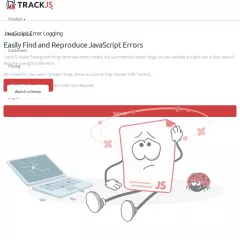
TrackJS is a JavaScript error tracking and monitoring service that helps developers identify, track, and diagnose errors that occur in their web applications. It provides real-time error reporting and detailed insights to help developers quickly resolve issues and improve the overall quality and stability of their web applications.
Here are some key features and functionalities of TrackJS:
Error Monitoring: TrackJS captures JavaScript errors that occur in web applications, including unhandled exceptions, syntax errors, network errors, and more. It records the stack trace, error message, browser information, and other relevant details for each error.
Real-time Reporting: When an error occurs, TrackJS sends real-time notifications to the developer, providing immediate awareness of issues. This allows developers to respond quickly and address errors before they impact users.
Error Insights: TrackJS provides detailed insights and diagnostic information for each error, including the line of code where the error occurred, browser and environment details, user actions leading up to the error, and other contextual data. This helps developers understand the root cause of the error and reproduce the issue for debugging.
Performance Monitoring: In addition to error tracking, TrackJS offers performance monitoring capabilities. It measures and reports on application performance metrics, such as page load times, AJAX request timings, and network latency. This helps developers identify performance bottlenecks and optimize the application for better user experience.
Integration and Alerting: TrackJS integrates with various development and collaboration tools, including popular issue trackers like JIRA, Slack, and GitHub. It allows developers to create custom rules and notifications to alert them when specific errors or error patterns occur, facilitating proactive error management.
Error Filtering and Aggregation: TrackJS provides options to filter and aggregate errors based on various criteria, such as error type, frequency, or specific parts of the codebase. This helps developers focus on critical errors and prioritize their debugging efforts.
Security and Privacy: TrackJS prioritizes data security and privacy. It ensures that sensitive user data, such as form inputs or passwords, is not captured or transmitted. Additionally, it offers features like IP anonymization and data retention controls to comply with privacy regulations.
Customization and Insights API: TrackJS provides a range of customization options, allowing developers to configure error tracking behavior, error grouping, and error reporting thresholds. It also offers an API for programmatically accessing error data, enabling integration with custom reporting or analysis workflows.
TrackJS is a valuable tool for developers, enabling them to proactively monitor, track, and diagnose JavaScript errors in their web applications. By quickly identifying and resolving errors, developers can improve application stability, user experience, and overall software quality.
Here are some key features and functionalities of TrackJS:
Error Monitoring: TrackJS captures JavaScript errors that occur in web applications, including unhandled exceptions, syntax errors, network errors, and more. It records the stack trace, error message, browser information, and other relevant details for each error.
Real-time Reporting: When an error occurs, TrackJS sends real-time notifications to the developer, providing immediate awareness of issues. This allows developers to respond quickly and address errors before they impact users.
Error Insights: TrackJS provides detailed insights and diagnostic information for each error, including the line of code where the error occurred, browser and environment details, user actions leading up to the error, and other contextual data. This helps developers understand the root cause of the error and reproduce the issue for debugging.
Performance Monitoring: In addition to error tracking, TrackJS offers performance monitoring capabilities. It measures and reports on application performance metrics, such as page load times, AJAX request timings, and network latency. This helps developers identify performance bottlenecks and optimize the application for better user experience.
Integration and Alerting: TrackJS integrates with various development and collaboration tools, including popular issue trackers like JIRA, Slack, and GitHub. It allows developers to create custom rules and notifications to alert them when specific errors or error patterns occur, facilitating proactive error management.
Error Filtering and Aggregation: TrackJS provides options to filter and aggregate errors based on various criteria, such as error type, frequency, or specific parts of the codebase. This helps developers focus on critical errors and prioritize their debugging efforts.
Security and Privacy: TrackJS prioritizes data security and privacy. It ensures that sensitive user data, such as form inputs or passwords, is not captured or transmitted. Additionally, it offers features like IP anonymization and data retention controls to comply with privacy regulations.
Customization and Insights API: TrackJS provides a range of customization options, allowing developers to configure error tracking behavior, error grouping, and error reporting thresholds. It also offers an API for programmatically accessing error data, enabling integration with custom reporting or analysis workflows.
TrackJS is a valuable tool for developers, enabling them to proactively monitor, track, and diagnose JavaScript errors in their web applications. By quickly identifying and resolving errors, developers can improve application stability, user experience, and overall software quality.